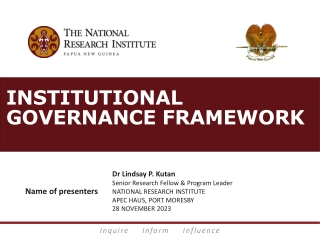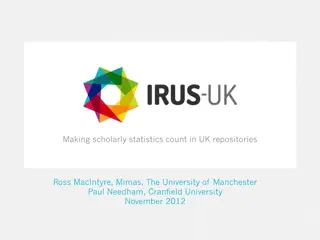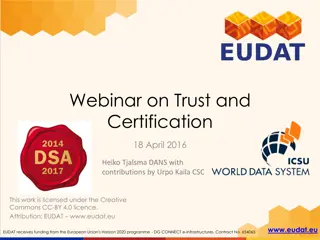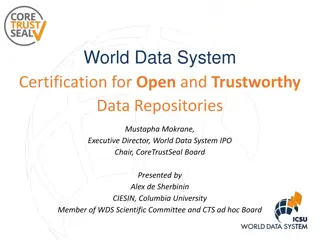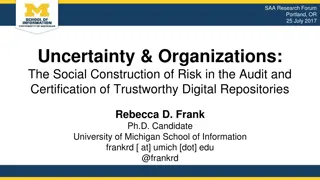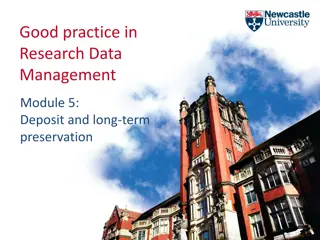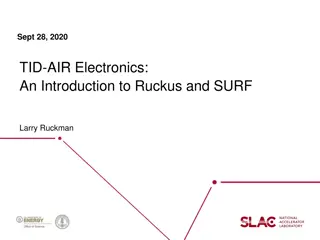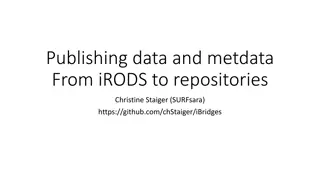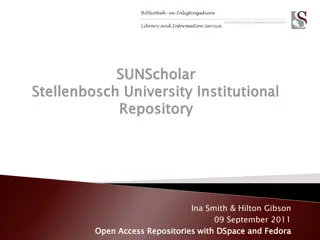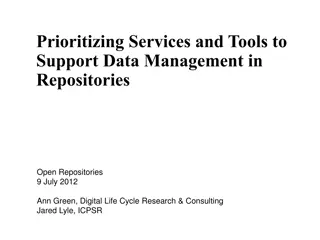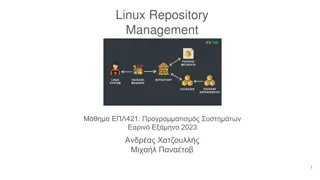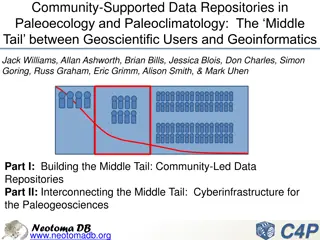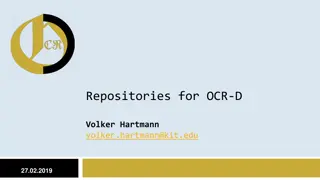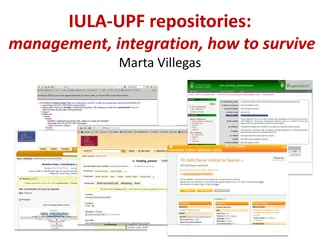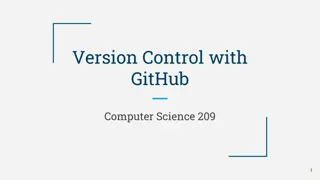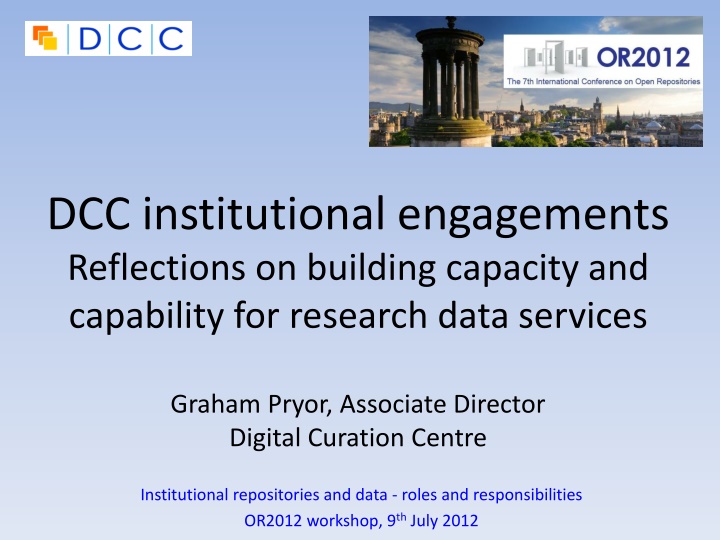
Reflections on Research Data Services and Institutional Repositories
Explore reflections on capacity building for research data services and the roles of institutional repositories, including discussions on repositories' impact, the Data Pyramid concept, structured data repositories, and the value of data across different tiers. Considerations for data preservation, access, and social responsibility are highlighted in this insightful content.
Download Presentation

Please find below an Image/Link to download the presentation.
The content on the website is provided AS IS for your information and personal use only. It may not be sold, licensed, or shared on other websites without obtaining consent from the author. If you encounter any issues during the download, it is possible that the publisher has removed the file from their server.
You are allowed to download the files provided on this website for personal or commercial use, subject to the condition that they are used lawfully. All files are the property of their respective owners.
The content on the website is provided AS IS for your information and personal use only. It may not be sold, licensed, or shared on other websites without obtaining consent from the author.
E N D
Presentation Transcript
DCC institutional engagements Reflections on building capacity and capability for research data services Graham Pryor, Associate Director Digital Curation Centre Institutional repositories and data - roles and responsibilities OR2012 workshop, 9thJuly 2012
Repositories have made significant inroads in terms of impact and use despite, in the case of institutional repositories, the very limited resources deployed. Subject repositories, like arXiv and PubMed Central, have certainly come of age but institutional repositories probably have not come of age yet although there are drivers in place which, in theory anyway, are moving them towards early adulthood. Digital repositories ten years on: what do scientific researchers think of them and how do they use them? David Nicholas et al, Learned Publishing, 25: 195 206; doi:10.1087/20120306
The Data Pyramid a hierarchy of rising value and permanence From Got Data? A Guide to Data Preservation in the Information Age, Francine Berman, ACM, 2008
The Data Pyramid a hierarchy of rising value and permanence Dryad? Acting as repository for data made accessible under journal data policy. Large Hadron Collider, Worldwide Protein Data Bank, etc. Breadth of the value of data increases up the tiers: from individual to community to social value. Each higher tier brings greater social responsibility and demands for access. As infrastructure increases, so must the attention to standards, sustainability and provenance. Use of off-the-shelf tools lacking curation functionality. Increasing trend towards portal services like Figshare. Redrawn from, Science as an Open Enterprise, Royal Society, 2012
Structured data repositories and databases: 5 - national platforms, genetics bias (e.g. Genbank) Domain specific and general data repositories: 146 - specialised national/international data vaults - publicly funded national data centres serving specific domains (NERC, UKDA, etc.) - includes 42 World Data Centres (Geology, Space Science, etc.) with limited online open access - only 1 is a university research data service (Edinburgh s DataShare) http://datacite.org/repolist at 26 June 2012
Three questions for you What responsibility should academic institutions have for supporting the data curation needs of their researchers? What responsibilities should academic institutions have for curating the data they produce? Should academic institutions engage with these questions only where there is no tier 1 or tier 2 service available?
DCC institutional engagements http://www.dcc.ac.uk/community/institutional-engagements 2. Diagnose practices Inventory data assets Profile norms, roles, values Identify infrastructure capacities Analyse current workflows Socio-technical management perspectives 1. Initiate change Identify drivers and champions Analyse perceived issues/challenges Identify capability gaps Assess costs, benefits, risks Information systems perspectives 3. Redesign research data services Produce feasible, desirable changes Evaluate fitness for purpose Research practice perspectives Adapted from Developing Research Data Management Capabilities by Whyte et al, DCC, 2012
Institutional engagements typical activity Institutional data catalogues Assess needs Workflow assessment Pilot RDM tools Develop support and services DAF & CARDIO assessments DCC support team Guidance and training RDM policy development Advocacy with senior management Customised Data Management Plans Make the case and support policy implementation
IE roles and responsibilities 50% of the engagements have senior academic champions Team leaders Library 11 Research office 7 IT services 2 Major support Library 7 Research office 2 IT services 6 Records management 2 Repository management 1
Principal foci of IEs Use of DCC tools (Data Asset Framework, CARDIO, DMP Online) 12 7 Roadmap design (EPSRC) 4 Policy development 4 Training in skills and techniques for support staff 2 Policy implementation
A rationale for institutional data repositories? The view from 15 out of 20 DCC institutional engagements Yes No Qualified All but two have only document IRs at present Do you have/anticipate having an institutional repository? 15 Do you expect to use it to store and manage research data? Do you expect to rely on data repository services operating at a national or international level where these exist? 3 maybe/probably 1 but not Big Data 8 3 But within a mixed economy; using persistent URLs to reference them 15 Complementary to IRs; wary of using only international Would these be seen as an alternative to institutional services? Will you be developing a research data catalogue that tracks your data wherever it is deposited? 11 4 3 maybe (and subject to funding) 1 - aspirational 11
Top challenges for the data repository champion FUNDING Cost and cost recovery, particularly longer term how much and who pays? How to ensure long term maintenance, sustainability and use BUY-IN Achieving academic staff/researcher engagement and high deposit rates Making the case and encouraging uptake through awareness raising Getting researchers to think about data management early enough in the lifecycle to make future management simpler SOCIO-TECHNICAL ISSUES Lowering the barriers to deposit Managing the reality that one size will not fit all types of data Providing user interaction beyond the download a file model that repositories typically offer Addressing the subject-specific nature of data and the potential for re-use by other disciplines Having an effective, up-to-date catalogue of all data in all repositories used Understanding the layers of metadata required to describe diverse datasets Recruiting a data specialist to take forward the library s role in data support Predicting the scale of data requirements, capacity planning
Why build institutional data repositories? Why stress over resolving the challenges reported here? Why struggle to secure and invest scarce resources in training, restructuring and depreciating capital infrastructure? Why not use alternative services (some already exist, e.g. national data centres and international repositories)? Why not seek to attract and exploit new entrants (e.g. specialised commercial services, emerging cloud services and the publishing community)? Why not focus on building institutional data catalogues? Human beings are the only creatures on Earth that pose the question why? . The floor is yours
Those initial three questions again What responsibility should academic institutions have for supporting the data curation needs of their researchers? What responsibilities should academic institutions have for curating the data they produce? Should academic institutions only engage with these questions where there is no tier 1 or tier 2 service available?

